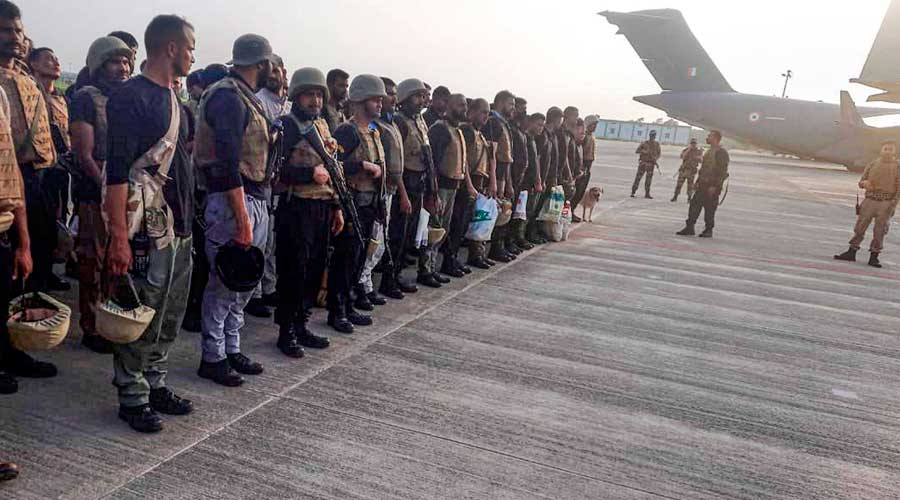With India emptying out its embassy in Kabul and flying its official personnel back home in the aftermath of the Taliban takeover of the Afghan capital, the parallels with 1996 are impossible to ignore.
Then, when the Taliban first grabbed power in Kabul, India shuttered its diplomatic mission and refused to recognize a regime that then — and now — counts Pakistan as its chief international sponsor and patron.
But as Afghanistan grapples with the discomfiting reality of returning to Taliban rule, India must learn from its experiences and avoid repeating its mistakes from the 1990s. And it must do so with the knowledge that if there’s one area where the hardline Sunni militant group appears keen on treading new ground, it’s on the issue of international relations.
The Taliban once killed Iranian diplomats. Now it’s talking with Tehran. It formed the core of the mujahideen that fought and defeated the Soviet Union in the 1980s. Today, Russia is one of a handful of countries — along with Pakistan and China — that have kept their embassies in Kabul open, confident that a newly-built relationship with the Taliban will serve its interests there.
China, which — like India — refused to recognize the Taliban in the 1990s, now hosts teams of Taliban leaders for publicized meetings with Beijing’s top diplomats. And don’t forget how the Kabul collapse all started: with a ‘peace’ deal signed by the United States of America and the Taliban in 2020. The current Joe Biden administration in the US might blame the former president, Donald Trump, for that pact, but the new government in Washington has chosen the roadmap for withdrawal from Afghanistan as one of the few legacies of its predecessor that it too has followed.
Indeed, India has, over the past year, slowly initiated diplomatic and security contacts with the Taliban. Qatari officials have revealed that an Indian team met with the Taliban’s political leaders in Doha in June. And while it was sensible to pluck Indian officials and personnel from Afghanistan for the time being, New Delhi hasn’t ruled out sending diplomats back there.
It’s tempting for the Indian government to sit back, wait and watch what unfolds in Afghanistan, and then take a decision on its next steps. That would be a folly. It must proactively continue to seek engagement with the Taliban — without committing to anything in return just yet. It must build on that engagement, dangling the carrot of economic and other incentives if the Taliban agrees to India’s core red lines, even if New Delhi eventually decides it can’t formally recognize a government run by the group.
In part, this should be a lesson India has learnt from its past blunders. By not engaging with the Taliban in the 1990s, India didn’t succeed in pressuring the group to mend its ways. On the contrary, when Pakistani hijackers took IC 814 to Kandahar, New Delhi had no contacts in the Taliban to speak with. It’s a lesson America appears to have learnt too. While there’s no love lost for the Taliban in Washington, the US has clearly reached an arrangement with the group that’s allowing America to retain control of Kabul airport long enough for it to evacuate its citizens and Afghan partners. In other words, if New Delhi’s primary goal in Afghanistan is to ensure that the country’s territory isn’t used to attack India, it stands a better chance by keeping lines of communication open with the Taliban.
But there’s another reason for India to approach its equation with the Taliban differently this time. Unlike earlier, the Taliban’s relations with multiple other nations — Russia, Iran, China, among others — means that the group is likely to want to gain some degree of independence from Pakistan. It’s unlikely that the militants will ever really break with Rawalpindi, home to Pakistan’s military headquarters. But if it is looking for more elbow room, India should be willing to join a careful dance with the Taliban.
To be sure, all of this depends on whether the Taliban has learnt lessons from its first stint in power in the 1990s. While the world was shocked by the public stoning and the moral police that whiplashed women who dared to step outside without male relatives, the Taliban’s biggest strategic weakness was Osama bin Laden, al Qaida’s founder and Saudi tycoon, who was bankrolling it. It was bin Laden who placed the Taliban in the crosshairs of the US and its allies.
In 2021, with a range of other nations ready to do business with it, the Taliban doesn’t need a terrorist financier. India has the strategic clout and economic heft to give the Taliban enough rational reasons to behave responsibly with it.
Given the group’s ties with the Pakistani military, that will be a difficult task and might not work. But to not try would be worse. In 1996, the Taliban was a global pariah. In 2021, if India doesn’t try and talk with the Taliban, New Delhi is the one that could be isolated. When the future of South Asia’s security is at stake, the region’s largest nation can’t be a bystander.











